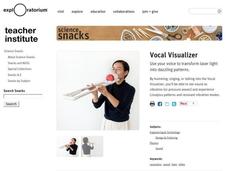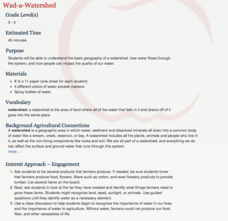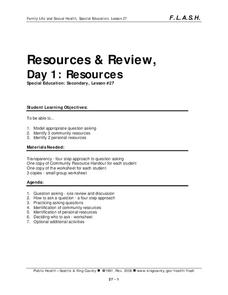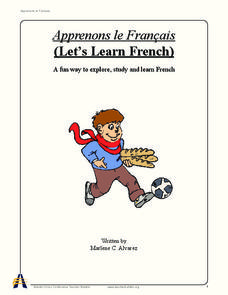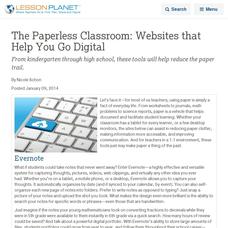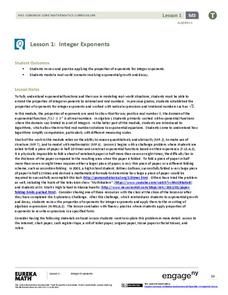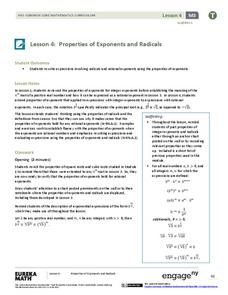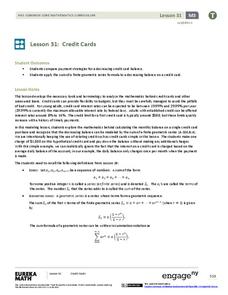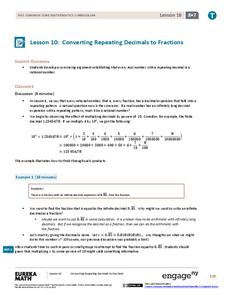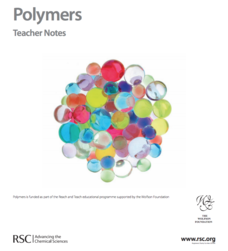University of Texas
Scarcity
How can having too little of something impact your life? Scholars investigate the concept of scarcity in their own lives and in the overall picture of the economy. Brainstorming activities as well as student-parent work bring to light...
Exploratorium
Vocal Visualizer
Make sound visible with an activity that provides directions for how to build a vocal visualizer meant to create light patterns. Making noise into the visualizer causes a mirror to vibrate, reflecting a laser beam, and creating the...
Agriculture in the Classroom
Wad-a-Watershed
What kind of impact do humans have on watersheds? Find out in a instructional activity that defines, explores, and promotes ways to protect our watersheds. The ultimate goal of the instructional activity is for learners to discover how a...
King Country
Lesson 27: Resources & Review - Day 1: Resources
To conclude a unit on family life and sexual health (FLASH), class members use the skills they have practiced in previous lessons to develop strategies for getting information or help when they need it.
Scholastic
Using What's in the Truck?: A Short Vowel Book
From bats and hats to pigs and fish, your youngsters will fill a truck with items that contain all the short vowel sounds using this great printable mini-booklet.
Atlantic Union Conference
Apprenons le Francais (Let's Learn French)
Bonjour! Teach your class this basic greetings and much more with a unit of materials. Included here are lessons, vocabulary practice materials and activities, conversation practice handouts, word puzzles, and more to support your class...
Global Secrets International
Help Your Kids Set Goals
Set young scholars on the path to success with this collection of goal setting worksheets. Offering support with setting and achieving personal and academic goals, this resource is a great way for elementary school teachers to help their...
Curated OER
Wide Mouthed Frog Memory or Wide Mouthed Frog Sight Word Game
How appropriate is playing a game of memory to help children memorize their sight words! Offering fun frog-themed flash cards and instructions for playing two different sight word games, this would make a great addition to the resource...
Curriculum Corner
8th Grade Math Common Core Checklist
Ensure your eighth graders get the most out of their math education with this series of Common Core checklists. Rewriting each standard as an "I can" statement, this resource helps teachers keep a record of when each standard was taught,...
Curated OER
Man's Search For Meaning: Concept Analysis
Designed as a resource for teachers who use Man's Search for Meaning, this seven-page packet includes a list of related informational texts, research issues and project ideas, central questions, background information on World War II and...
EngageNY
Bacteria and Exponential Growth
It's scary how fast bacteria can grow — exponentially. Class members solve exponential equations, including those modeling bacteria and population growth. Lesson emphasizes numerical approaches rather than graphical or algebraic.
EngageNY
Solving Equations with Radicals
Show learners how to develop a procedure for solving equations using radicals with the fifth instructional activity of the 25-part module that challenges learners to use properties to solve multi-step quadratic and cubic equations....
Curated OER
The Paperless Classroom: Websites that Help You Go Digital
From kindergarten through high school, these tools will help reduce the paper trail.
Maryland Department of Education
The Concept of Diversity in World Literature Lesson 12: Author's Purpose - Yeats and Achebe
Is there such a thing as fate/luck? Can one fight destiny? As part of their study of Chinua Achebe's purpose in writing Things Fall Apart, class members answer these questions from Achebe's point of view and then from William Butler...
EngageNY
Integer Exponents
Fold, fold, and fold some more. In the first installment of a 35-part module, young mathematicians fold a piece of paper in half until it can not be folded any more. They use the results of this activity to develop functions for the area...
EngageNY
Properties of Exponents and Radicals
(vegetable)^(1/2) = root vegetable? The fourth installment of a 35-part module has scholars extend properties of exponents to rational exponents to solve problems. Individuals use these properties to rewrite radical expressions in terms...
EngageNY
The Zero Product Property
Zero in on your pupils' understanding of solving quadratic equations. Spend time developing the purpose of the zero product property so that young mathematicians understand why the equations should be set equal to zero and how that...
EngageNY
The Most Important Property of Logarithms
Won't the other properties be sad to learn that they're not the most important? The 11th installment of a 35-part module is essentially a continuation of the previous lesson, using logarithm tables to develop properties. Scholars...
EngageNY
Modeling with Exponential Functions
These aren't models made of clay. Young mathematicians model given population data using exponential functions. They consider different models and choose the best one.
EngageNY
Newton’s Law of Cooling, Revisited
Does Newton's Law of Cooling have anything to do with apples? Scholars apply Newton's Law of Cooling to solve problems in the 29th installment of a 35-part module. Now that they have knowledge of logarithms, they can determine the decay...
EngageNY
Credit Cards
Teach adolescents to use credit responsibly. The 32nd installment of a 35-part module covers how to calculate credit card payments using a geometric series. It teaches terminology and concepts necessary to understand credit card debt.
EngageNY
Converting Repeating Decimals to Fractions
Develop a process with your classes for converting repeating decimals to fractions. Through this process, pupils understand that any repeating decimal can be written as a fraction. The 10th lesson in this 25-part module helps reinforce...
Classroom Law Project
What should I watch for in the debates?
Prepare your classes for election year debates with a series of activities that model how to watch televised debates and how to evaluate the moderators as well as the debaters.
Royal Society of Chemistry
Polymers—Gifted and Talented Chemistry
Polymers are an important part of our day-to-day lives, but how much do your pupils know about them? Learn the basics and beyond in a series of activities designed to build skills in observation, planning, organic chemistry, and bonding.
Other popular searches
- Substitute Teacher Resources
- Science Teacher Resources
- Teacher Resources Tenses
- Math Teacher Resources
- Esl Teacher Resources
- Computer Teacher Resources
- Teacher Resources Visual Art
- Download Teacher Resources
- French Teacher Resources
- Teacher Resources Rating=3
- Math Teacher Resources K12
- Free Esl Teacher Resources



